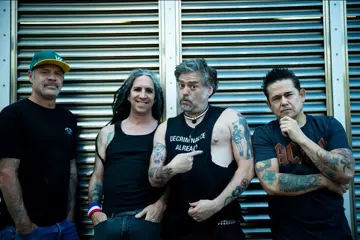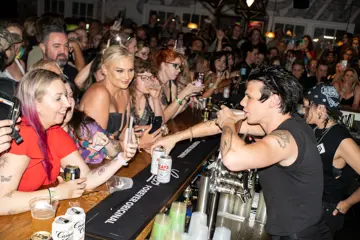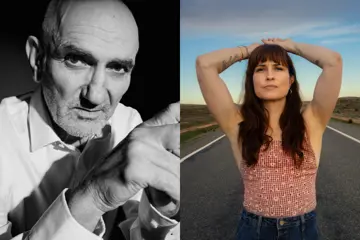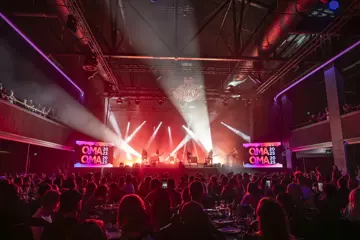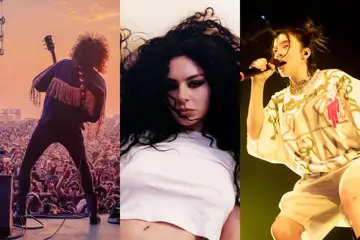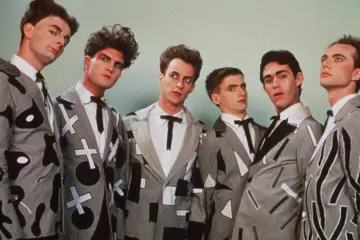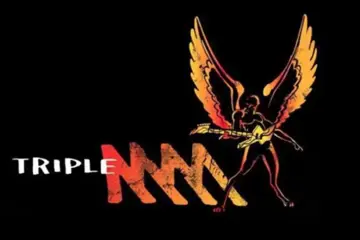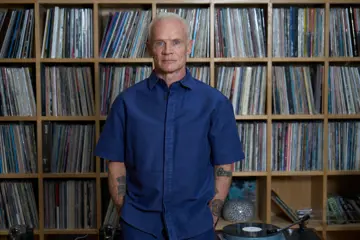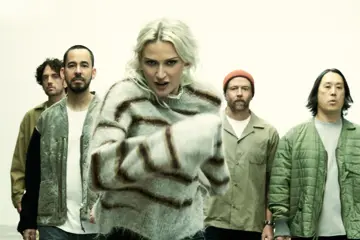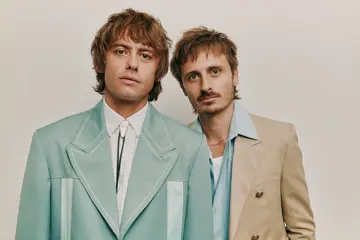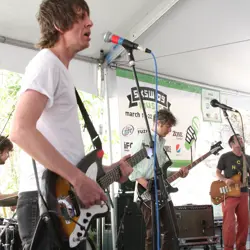 Obits
ObitsRick Froberg has always been an unassuming type for a rock'n'roller, happy to let his music do the talking for him, and his time fronting his most recent outfit Obits is no exception. The Brooklyn-born and bred four-piece have existed quietly since 2006, releasing two solid albums – 2009's I Blame You and 2011's Moody, Standard And Poor – but not really doing much more than the occasional tour, and the entailing obligations. Even Obits' current predicament was somewhat of a happy accident, a leaked tape of their first gig – which itself didn't happen until they'd already been jamming for well over a year – finding its way into the hands of an executive from the prestigious indie label Sub Pop, who invited them to Seattle for a roster shindig and ultimately signed them.
But of course Froberg's impeccable rock'n'roll resume goes back far beyond such recent encounters. Way back in the mid-'80s he was singer for San Diegan post-hardcore outfit Pitchfork, and when that band dissolved he and its guitarist John “Speedo” Reis – later to find fame as frontman of Rocket From The Crypt – formed the iconic Drive Like Jehu, who would in time prove to be incredibly influential in the worlds of post-hardcore and straight-up rock'n'roll. After five years and two albums Drive Like Jehu also disbanded, Froberg moving to New York City to concentrate on his career as a visual artist (his distinctive style can be found on the artwork of many of the albums released by these bands). In 1999 Froberg and Reis reunited once more under the ferocious garage guise of Hot Snakes until its demise in 2005 (they only recently reunited). Froberg then formed Obits with some other like-minded folk in his neighbourhood, before once more being dragged back into the spotlight. Some people chase fame, others just seem born into it.
“I'm really looking forward to coming down to Australia – I've been one time, it was pretty great,” the quietly-spoken musician tells, referencing Hot Snakes' Australian sojourn back in 2005. “I think there's some amazing bands to have come from Australia. Obviously The Saints are from Brisbane – you know who they are – but we love lot of that stuff, a lot of the awesomely crappy punk stuff like The Victims or The Missing Links, and bands like Radio Birdman and the Sunnyboys. Even AC/DC are one of my fave bands, there's so much great stuff down there.”
Froberg turns his mind back to the formation of Obits and the fact that he didn't want the band to sound like any of his former outfits.
“It was important in the sense that I didn't want it to be like those things – I definitely wanted it to be something different,” he reflects. “But you do what you do, whatever it is, and that's how it's going to come out, so it wasn't that important. I try to walk the line between the two things. It took a while [for the Obits sound] to develop – we didn't sit around and suddenly articulate a vision or direction, it doesn't work like that. You have to actually figure something out what you like and that took a while, it wasn't an overnight thing.”
Don't miss a beat with our FREE daily newsletter
The Obits sound is a sinuous beast, its foundations definitely rooted in the garage realm but characterised by the twin guitars of Froberg and his partner-in-crime Sohrab Habibion weaving in and around each other like demented snakes, but with an added element of restraint and use of space that sets them apart from any of their former outfits (Habibion was previously in the equally raucous Edsel ).
“I think we just try to live with each other [musically], because there's a lot of different things going on in the band and you have to create space for everything – it's important to do that,” Froberg ponders of the band's chemistry. “I think that's why people know that there's two guitars – you can have three guitars in a band and not even know it, because they're all playing over the top of each other and producing this one big sound, so we try to use silence and space as much as we can. Well, you can't really use silence in rock'n'roll, but we try to create space, and I think that makes everything sound better because it has room to move and breathe.”
Froberg tells that the band's live sound is quite removed from their recorded output, mainly because he forgets what those recorded versions actually sound like.
“Well, I think that we have a tendency to play things differently here and there – it's sort of like a game of Chinese Whispers,” he laughs. “We don't sit around and listen to our records too much, so we just play the songs over and over and in the end that means that they move further and further away from their starting point – they change from the original thing, from the record, which we don't listen to. It works for me. We just stand around and play pretty much. There's no 'show' or anything like that. It's a real rock band subsisting in a rock format, it's just a bunch of un-rock-looking guys doing it.”
Obits absorbed a line-up change recently, Alexis Fleisig stepping in on drums for the departed Scott Gursky, and Froberg believes that it's had a positive change on the band's sound.
“Yeah, it's a totally different thing though. It's not the same as it was before, it's like a completely new entity in some ways,” he enthuses. “But it's working out fine – he's a super great guy and a super great drummer, he has a lot of wallop. He was in Girls Against Boys and some pretty legendary DC punk bands, he's a great guy.”
Obits are at roughly the point where all of Froberg's other bands floundered and disbanded – does he see this as a sign that maybe Obits is here to stay?
“No, not necessarily, I think it's just working out, really. While I'm having a good time I'm there,” he chuckles. “You keep going until that stops happening, and then you do something else. I'm not a very blueprint-y guy, I tend to fly by the seat of my pants.”
Does Froberg feel that the experience of being in a touring rock band has changed since he started out all those years ago?
“Yeah it has somewhat, but the experience is fundamentally not that different,” he considers. “Many times these days we can stay in hotels, we get to do things like go to Australia which we couldn't really do in the past. I think it's easier to put things together because of the Internet. I think people are different but it's all pretty much the same thing at the end of the day when you go out and play. We still occasionally sleep on floors – actually, more than occasionally – so if you like that first thing, it's got it all, pretty much.”

